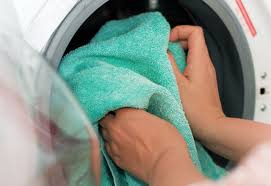Towels are an everyday essential, but without proper care, they can quickly lose their softness, absorbency, and durability. To ensure your towels stay fresh and long-lasting, it’s crucial to wash and care for them the right way. This guide provides actionable tips on cleaning, drying, and storing your towels, helping you maximize their lifespan and maintain their quality for years to come.
Why Proper Towel Care Matters
Towels endure heavy use—from drying off after showers to cleaning up spills. Over time, dirt, body oils, detergent buildup, and even improper washing can degrade their fibers. By following a consistent care routine, you’ll not only extend their lifespan but also ensure they remain hygienic and effective.
Steps to Wash Towels Properly
1. Wash New Towels Before Use
Always wash new towels before their first use. Manufacturing residues and excess dyes can affect their absorbency and irritate sensitive skin. Washing them first removes these residues and helps soften the fabric.
2. Separate Towels from Other Laundry
To prevent color bleeding and lint transfer, wash towels separately from clothing or other fabrics. Dark and brightly colored towels should be washed with similar colors to avoid staining lighter towels.
3. Use the Right Detergent and Amount
Opt for a mild, fragrance-free detergent. Using too much detergent can cause buildup, leading to stiff and less absorbent towels. For best results, use the manufacturer’s recommended amount or half of it for regular washes.
4. Choose the Right Water Temperature
Wash towels in warm water (around 40°C/104°F) to effectively clean and kill bacteria. For white towels or heavily soiled ones, hot water may be appropriate. However, check the care label first to avoid shrinkage or fabric damage.
5. Skip Fabric Softener
Fabric softeners may make towels feel softer initially, but they create a water-repellent layer that reduces absorbency over time. Instead, add half a cup of white vinegar during the rinse cycle to naturally soften towels and remove detergent residue.
6. Avoid Overloading the Washer
Overloading the washing machine prevents towels from getting thoroughly cleaned. Ensure there’s enough space for water and detergent to circulate properly.
How to Dry Towels for Optimal Longevity
1. Shake Towels Before Drying
Give towels a good shake before putting them in the dryer or hanging them to dry. This helps fluff up the fibers and maintains their softness.
2. Use Low Heat in the Dryer
Dry towels on a low or medium heat setting to prevent excessive wear and shrinkage. Over-drying can make them stiff and brittle over time.
3. Line Dry When Possible
Air-drying towels outdoors is an energy-efficient option that also preserves their fibers. If line-drying, avoid direct sunlight for colored towels to prevent fading.
4. Avoid Dryer Sheets
Like fabric softeners, dryer sheets can leave a residue that reduces absorbency. Stick to natural alternatives like wool dryer balls to speed up drying and maintain softness.
Tips for Storing Towels
1. Ensure Towels Are Completely Dry
Always make sure towels are fully dry before folding and storing them. Damp towels are a breeding ground for mold and mildew, which can lead to unpleasant odors.
2. Store in a Dry, Well-Ventilated Space
Keep towels in a cool, dry place. Avoid storing them in overly humid bathrooms to prevent the growth of bacteria and mildew.
3. Rotate Towels Regularly
Use a rotation system to ensure even wear. This not only extends the life of your towels but also keeps your collection looking fresher for longer.
Common Mistakes to Avoid
- Using Too Much Detergent: Excess detergent creates buildup and stiffens towels.
- Skipping Regular Washing: Towels should be washed every three to four uses to maintain hygiene.
- Using Bleach Frequently: Bleach weakens fibers and should only be used sparingly on white towels.
- Ironing Towels: Ironing can crush the loops, reducing absorbency.
Why Invest in Quality Towels?
Proper care is vital, but starting with high-quality towels makes a big difference. Premium towels are more durable, absorbent, and resistant to wear. If you’re unsure where to start, look for options made from 100% cotton with a high GSM (grams per square meter), which indicates thickness and durability. According to Cotton Incorporated, cotton’s natural properties make it ideal for household textiles, including towels.
Environmental Benefits of Proper Towel Care
Extending the life of your towels reduces waste and conserves resources. Proper washing and drying techniques not only save money but also minimize the environmental impact of frequent replacements.
Conclusion
Washing and caring for your towels properly ensures they remain soft, absorbent, and long-lasting. From using the right detergent to drying them carefully, these simple steps can make a big difference in the longevity and performance of your towels. By avoiding common mistakes and following best practices, you’ll save money and contribute to a more sustainable lifestyle. With the right care, your towels will not only look and feel great but also serve you well for years to come.

